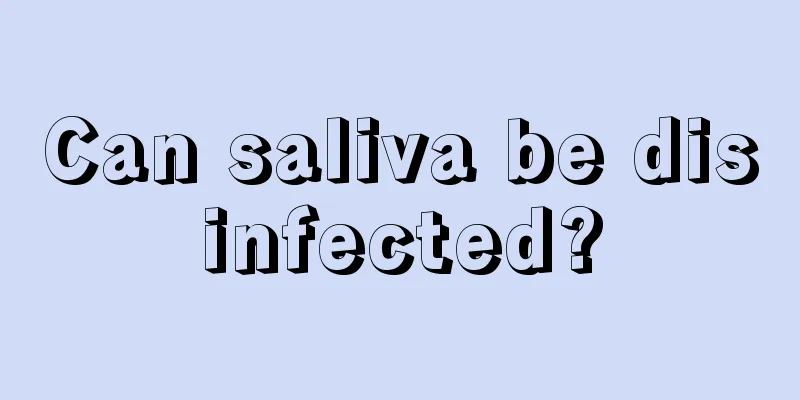Can saliva be disinfected?

|
There is saliva in everyone's mouth. Although saliva is inconspicuous in the human mouth, it plays an important role in the human mouth. Saliva can keep a person's mouth in an acid-base balance to prevent bacterial invasion. Saliva also helps promote the metabolism of human oral cells. In addition, saliva also has many uses in daily life. Can saliva be used to disinfect human wounds? The healing effect of saliva Wounds or mucosal lesions in the mouth heal much faster than skin wounds. Because saliva contains a variety of growth factors and thrombin, it can stop bleeding and promote wound recovery. However, if there is no constant supply of saliva like in the oral environment, the amount of growth factors, thrombin, etc. supplemented to the wound by licking alone is really negligible. So while it works in theory, it may be hard to observe in real life. Antibacterial effects of saliva Judging from its ingredients, saliva does have antibacterial effects, and one important substance that must be mentioned is lysozyme. Under normal circumstances, the body's saliva, tears, sputum, nasal secretions, white blood cells and serum are rich in lysozyme, which is part of the body's immune system and can destroy the cell walls of bacteria, causing cell fragmentation and thus exerting a bactericidal effect. Does saliva have a healing effect on wounds? However, even though there are antibacterial substances such as lysozyme in the mouth, more than 500 species of bacteria have been found in the mouth, among which oral streptococci are the dominant bacteria, accounting for about 60% of the total number of cultured bacteria. Although most of the bacteria in the mouth of a healthy person are harmless, and such "bacterial exchange" is unlikely to cause disease in the absence of other pathogenic bacteria, if these bacteria enter the blood through a wound, they may cause infection. In contrast, the animal's saliva appears to be more effective and safer for its own wounds. This may be an evolutionary advantage, because if they live in the wild, they cannot apply medicine to themselves when injured or seek help from a doctor, so they can only use saliva to treat the wound. But if it is a serious external injury, no matter how much they lick it, it will be useless. We have worked hard to evolve for tens of millions of years, not just to lick them! We have better ways to heal wounds. What should I do if I get a cut or abrasion? If the wound is shallow and bleeding is not much, you can treat it yourself 1. Stop bleeding and clean the wound: After washing your hands, press the wound tightly with sterile gauze for 5 to 15 minutes. Then rinse the area around the wound with clean water or saline. 2. Bandaging and applying medicine: After cleaning the wound, use iodine tincture for disinfection. If the wound is small, you can put a Band-Aid on it. If the wound is large, you can cover it with clean gauze and wait for the wound to scab over naturally. If the wound is slightly red and swollen and you suspect it may be infected, you can apply erythromycin ointment or mupirocin ointment to the wound. 3. Change the dressing promptly: Replace Band-Aids and gauze on time. If they stick to the wound, wet them with saline and gently peel them off. If it gets wet or dirty, replace it in time. 4. Pain relief: If the wound is very painful, you may consider taking pain relievers such as ibuprofen. Situations requiring medical attention 1. Unable to stop bleeding; 2. The abrasion is deep, at the joint, or the fat and muscle are exposed at the wound; 3. Wounds caused by animal claws, sharp instruments with dirty surfaces, etc., or dirt on the wound cannot be removed; 4. The wound does not heal for a long time or becomes red, swollen and painful, or symptoms such as redness, swelling, suppuration or persistent pain appear; 5. Never received a tetanus vaccination, or the last vaccination has been more than ten years ago. TIPS: Before going to the hospital, you can treat the wound yourself - rinse it with clean water and apply pressure with clean gauze or towels to stop the bleeding. When sending the injured area to the hospital, keeping it above the level of the heart can reduce blood outflow to a certain extent. Do not apply salt, pickled food, powder or other strange things on the wound. Do not use alcohol, iodine, mercurochrome, gentian violet, etc. to apply on the wound. |
<<: Complications of quitting smoking
Recommend
How to judge epididymal nodules
Under normal circumstances, the male epididymis i...
Can potatoes be eaten after being stored for a long time?
Potatoes are a food that many people love to eat....
Is the black ink of cuttlefish poisonous?
The black ink in cuttlefish is actually non-toxic...
What is the cause of breast lumps and pain?
If any female friend in your life finds that her ...
What is the reason for vomiting after drinking
Drinking culture is one of China's unwritten ...
To prevent stomach cancer, you should eat more of these five kinds of vegetables
Gastric cancer is a very terrible digestive tract...
Is sweet potato flour considered an allergy-inducing food?
Many people love to eat sweet potato noodles, but...
Postoperative care for rectal cancer
Everyone must be curious about the postoperative ...
Wind-heat cold symptoms and treatment knowledge
Wind-heat cold is actually what we often call the...
How is small cell lung cancer generally treated?
Small cell lung cancer is caused by smoking, whic...
What are the effects of cold onions
Summer is here and the weather is getting hotter....
What is Ovarian Cancer
What is ovarian cancer? The occurrence of ovarian...
Can Chinese toon be eaten in the refrigerator?
Toona sinensis is a food ingredient with a unique...
What causes prostate cancer?
The occurrence of prostate cancer is related to m...
What are the traditional Chinese medicine treatments for lung cancer? Four methods of treating lung cancer with traditional Chinese medicine
Lung cancer is feared by everyone, after all, it ...









